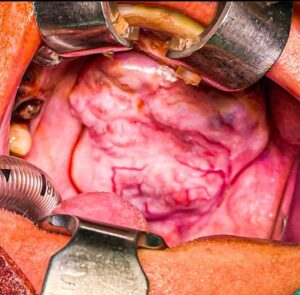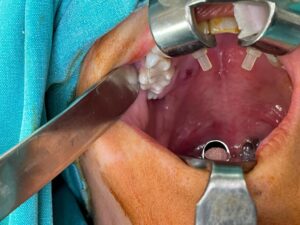Table of Contents

Indications for Hard Palate Cancer Surgery
The most common indication for hard palate cancer surgery is the presence of a tumor in the hard palate that has been confirmed as cancerous. In some cases, surgery may be recommended even if the tumor is not cancerous, but it is causing pain or discomfort, or if there is concern that it could develop into cancer in the future. Additionally, if the cancer has spread to nearby lymph nodes, surgery may be necessary to remove the affected lymph nodes.
Procedure
Hard palate cancer surgery is typically performed under general anesthesia, which means that the patient is asleep during the procedure. The procedure involves making an incision in the roof of the mouth to gain access to the tumor. The tumor and any affected tissue or lymph nodes are carefully dissected and removed from the surrounding tissue. The incision is then closed with sutures or staples.
In some cases, if the tumor is large or located close to important structures such as nerves or blood vessels, the surgeon may use a more complex technique such as reconstructive surgery to restore the appearance and function of the affected area.
Recovery
After the procedure, the patient will be monitored in the recovery room until they are fully awake and stable. Most patients will need to stay in the hospital for a few days for observation and to manage pain and other symptoms. After leaving the hospital, patients will need to follow a strict regimen of oral care to promote healing and reduce the risk of infection.
Recovery time varies, but most people can return to normal activities within a few weeks after the procedure. Common side effects after surgery include pain, swelling, and bruising in the affected area. Pain can typically be managed with over-the-counter pain medication or prescription pain medication if necessary.
Risks
As with any surgery, hard palate cancer surgery carries some risks, such as bleeding, infection, and complications related to anesthesia. Bleeding is the most common complication, and it can occur up to two weeks after the surgery. In some cases, bleeding may require a return trip to the operating room.
Infection is another potential risk of hard palate cancer surgery. Antibiotics may be prescribed after the surgery to reduce the risk of infection. Complications related to anesthesia, such as a reaction to the medication, are rare but can occur.

Benefits
Hard palate cancer surgery has several benefits, particularly in cases where the tumor is causing pain or discomfort, or if there is concern that it could develop into a more serious condition. Removing the tumor can also improve the appearance of the affected area and restore normal function, such as the ability to speak or eat.
Additionally, if the cancer has spread to nearby lymph nodes, removing the affected lymph nodes can help to prevent the cancer from spreading further and improve the chances of a positive outcome.
Hard palate cancer surgery is a common surgical procedure that is typically performed to remove cancerous tumors in the hard palate or nearby lymph nodes. While there are risks associated with the procedure, the benefits of hard palate cancer surgery can be significant, particularly in cases where the tumor is causing pain or discomfort or if there is concern that it could develop into a more serious condition. If you are considering hard palate cancer surgery, it is important to discuss the risks and benefits of the procedure with your healthcare provider, and to consider the potential costs.
Post Operative Hard Palate Cancer Surgery Procedure
Pain Management: Pain is common after hard palate cancer surgery, and patients may be prescribed medication to manage it. It is important to take pain medication as directed to help manage pain effectively and prevent complications.
Wound Care: After surgery, the surgical site will need to be kept clean to prevent infection. Patients may be instructed to rinse their mouth with saltwater or a prescribed mouthwash to help clean the surgical site. It is important to avoid touching the surgical site with the tongue or fingers.
Oral Hygiene: Oral hygiene is important after surgery to prevent infection and promote healing. Patients may be advised to brush their teeth gently with a soft-bristled toothbrush and avoid flossing or using a Waterpik until the surgical site has healed.
Diet: After surgery, patients may be advised to follow a soft-food diet or avoid certain foods to prevent irritation to the surgical site. It is important to follow any dietary instructions provided by the healthcare provider.
Rest: Rest is important after surgery to promote healing and reduce the risk of complications. Patients should avoid strenuous activity or heavy lifting for several weeks after surgery.
Follow-Up Appointments: Follow-up appointments with the healthcare provider are important after hard palate cancer surgery. The healthcare provider will monitor the surgical site and address any concerns or complications that may arise.
It is important to follow all post-operative procedures as directed by the healthcare provider to ensure a successful recovery after hard palate cancer surgery. Patients should also contact their healthcare provider if they experience any complications, such as excessive bleeding, fever, or severe pain. With proper care and follow-up, patients can expect a successful recovery and improved quality of life after hard palate cancer surgery.
Hard Palate Cancer Surgery Cost
In general, the cost of hard palate cancer surgery can range from several thousand dollars to tens of thousands of dollars. The exact cost will depend on the complexity of the procedure, the location, and other factors such as whether the patient has insurance coverage.
For patients with health insurance, the cost of hard palate cancer surgery will depend on the type of insurance they have and the specific policy. Many insurance plans will cover all or a portion of the cost of the surgery, but patients should check with their insurance provider to determine their coverage.
For patients without insurance or with insurance that does not cover the full cost of the procedure, there are several options for managing the cost. Some healthcare providers offer payment plans or financing options to help patients pay for the surgery over time. Additionally, patients may be able to negotiate the cost of the procedure with their healthcare provider.
It is important to note that the cost of hard palate cancer surgery is only one factor to consider when deciding whether to undergo the surgery. Patients should also consider the potential risks and benefits of the procedure, as well as their overall health and well-being. Patients should discuss the risks and benefits of hard palate cancer surgery with their healthcare provider to determine if the procedure is right for them.
In conclusion, the cost of hard palate cancer surgery can vary widely depending on several factors, and patients should carefully consider the potential risks and benefits of the procedure. Patients should discuss the potential costs and the risks and benefits of hard palate cancer surgery with their healthcare provider to determine if the procedure is right for them. It is also important to choose a reputable hospital or clinic that provides high-quality care and has a good reputation for treating hard palate cancer.
The Best Location for Hard Palate Cancer Surgery
United States: The United States is home to some of the world’s leading medical institutions, with highly skilled healthcare providers and advanced facilities. However, the cost of healthcare in the United States can be quite high.
Germany: Germany is known for its highly specialized medical facilities and highly trained healthcare providers. The cost of healthcare in Germany is generally lower than that of the United States, but higher than in some other countries.
India: India has emerged as a popular destination for medical tourism, with high-quality healthcare facilities and experienced healthcare providers. The cost of healthcare in India is generally lower than that of the United States or Germany.
Turkey: Turkey is another popular destination for medical tourism, with a range of specialized healthcare facilities and experienced healthcare providers. The cost of healthcare in Turkey is generally lower than that of the United States or Germany.
Singapore: Singapore has a reputation for providing high-quality healthcare with advanced facilities and highly trained healthcare providers. The cost of healthcare in Singapore is generally higher than that of India or Turkey, but lower than that of the United States or Germany.
Ultimately, the best country for hard palate cancer surgery will depend on the individual patient’s needs and preferences. Patients should carefully consider the quality of care, the cost of the procedure, and the reputation of the healthcare providers and facilities before deciding on a country for their surgery. It is important to choose a reputable healthcare provider and facility that specializes in hard palate cancer surgery to ensure the best possible outcome.
Adjuvant Treatment for Hard Palate Cancer
Adjuvant treatment for hard palate cancer may be recommended after surgery to help prevent the cancer from returning or spreading to other parts of the body. The most common types of adjuvant treatment for hard palate cancer are radiation therapy and chemotherapy. Here is an overview of each type of adjuvant treatment:
Radiation Therapy:
Radiation therapy uses high-energy radiation to kill cancer cells. Radiation therapy may be used after surgery to kill any cancer cells that were not removed during the surgery or that may have spread to nearby lymph nodes. Radiation therapy may also be used to shrink tumors before surgery.
Chemotherapy:
Chemotherapy uses drugs to kill cancer cells. Chemotherapy may be used after surgery to kill any cancer cells that were not removed during the surgery or that may have spread to other parts of the body. Chemotherapy may also be used in combination with radiation therapy.
The specific type of adjuvant treatment recommended for hard palate cancer will depend on the individual patient’s needs and the extent of the cancer. Adjuvant treatment may also have side effects, such as fatigue, nausea, and hair loss, but these side effects can typically be managed with medications or other therapies.
It is important for patients to discuss the potential benefits and risks of adjuvant treatment with their healthcare provider to determine if it is right for them. Additionally, patients should follow up with their healthcare provider regularly after adjuvant treatment to monitor for any potential side effects or recurrence of the cancer.
Palatal Prosthesis After Surgery
Palatal prosthesis, also known as obturator prosthesis, is a dental prosthesis that is used to replace missing or damaged tissue in the hard palate after surgery. It is a removable appliance that is custom-made to fit the specific shape of the patient’s mouth and provide support for the surrounding tissues.
Palatal prosthesis is often used after hard palate surgery to help the patient speak, eat, and drink normally. The surgery can cause changes to the structure of the hard palate, which can affect the patient’s ability to perform these basic functions. Palatal prosthesis can help to restore normal function and improve the patient’s quality of life.
The process of creating a palatal prosthesis typically involves several steps. First, the dentist or prosthodontist will take impressions of the patient’s mouth to create a model of the hard palate. From this model, a custom-made palatal prosthesis is created using materials such as acrylic resin or silicone.
Once the palatal prosthesis is created, it is fitted to the patient’s mouth and adjusted as necessary to ensure a proper fit. The patient may need to return for follow-up appointments to ensure that the palatal prosthesis continues to fit properly and to make any necessary adjustments.
Palatal prosthesis can provide several benefits for patients after hard palate surgery, including:
Improved speech: Palatal prosthesis can help to improve speech clarity and reduce nasal-sounding speech that can occur after hard palate surgery.
Improved eating and drinking: Palatal prosthesis can help to improve the patient’s ability to chew and swallow food and drink, which can improve their nutrition and overall health.
Improved comfort: Palatal prosthesis can help to support the surrounding tissues and reduce discomfort or pain that may occur after hard palate surgery.
Improved appearance: Palatal prosthesis can be designed to closely match the patient’s natural teeth and gums, which can improve the appearance of the mouth and smile.
In conclusion, palatal prosthesis can be an effective treatment option for patients who have undergone hard palate surgery. It can provide several benefits, including improved speech, eating and drinking, comfort, and appearance. Patients should discuss the potential benefits and risks of palatal prosthesis with their healthcare provider to determine if it is right for them.
